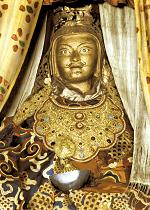Samyé: Difference between revisions
mNo edit summary |
|||
| (7 intermediate revisions by 4 users not shown) | |||
| Line 1: | Line 1: | ||
[[Image:Samye Monastery cropped.JPG|frame| | [[Image:Samye Monastery cropped.JPG|frame|Samye Monastery as it is today]] | ||
'''Samyé''' ([[Wyl.]] ''bsam yas'') — the first Buddhist monastery in Tibet, built during the time of [[King Trisong Detsen]]. The name means ‘inconceivable’. | '''Samyé''' (Tib. བསམ་ཡས་, [[Wyl.]] ''bsam yas'') — the first Buddhist monastery in Tibet, built during the time of [[King Trisong Detsen]]. The name means ‘inconceivable’. | ||
==History== | ==History== | ||
The great abbot [[Shantarakshita]] made the first attempt to construct the monastery but the building would always collapse after reaching a certain stage. Terrified, the construction workers believed that there was a demon in a nearby river making trouble. However, when the great Guru [[Padmasambhava]] arrived from northern India, he was able to subdue the demons obstructing the building of Samye. | The great abbot [[Shantarakshita]] made the first attempt to construct the monastery but the building would always collapse after reaching a certain stage. Terrified, the construction workers believed that there was a demon in a nearby river making trouble. However, when the great Guru [[Padmasambhava]] arrived from northern India, he was able to subdue the demons obstructing the building of Samye. It is said to have been completed in 766 CE and consecrated the year after. | ||
[[Image:Guru ngadrama.JPG|thumb|The famous '[[Looks Like Me]]' statue of [[Guru Padmasambhava]] at Samye]] | |||
Samye Monastery was badly damaged during the Cultural Revolution and renovated beginning in the 1980s. Today it is still an active monastery and important pilgrimage destination. | Samye Monastery was badly damaged during the Cultural Revolution and renovated beginning in the 1980s. Today it is still an active monastery and important pilgrimage destination. | ||
==The Monastery== | ==The Monastery== | ||
Samye Monastery is laid out on the shape of a giant [[mandala]], with the main temple representing the legendary [[Mount Meru]] in the centre. Other buildings stand at the corners and cardinal points of the main temple, representing continents and other features of the Buddhist universe. | Samye Monastery is laid out on the shape of a giant [[mandala]], with the main temple representing the legendary [[Mount Meru]] in the centre. Other buildings stand at the corners and cardinal points of the main temple, representing continents and other features of the Buddhist [[world|universe]]. | ||
==Further Reading== | ==Further Reading== | ||
*''[[A Great Treasure of Blessings]]'', pages 32-33. | *''[[A Great Treasure of Blessings]]'', pages 32-33. | ||
*Victor Chan, ''Tibet Handbook—A Pilgrimage Guide'' (Chico: Moon Publications, 1994), 'The Samye Mandala', pages 295-313. | |||
==Internal Links== | ==Internal Links== | ||
*[[Samyé Debate]] | *[[Samyé Debate]] | ||
*[[Tsimara]] | |||
[[Category:Nyingma Monasteries]] | [[Category:Nyingma Monasteries]] | ||
[[Category:Nyingma]] | [[Category:Nyingma]] | ||
[[Category:Tibet]] | [[Category:Tibet]] | ||
Latest revision as of 15:34, 15 May 2021

Samyé (Tib. བསམ་ཡས་, Wyl. bsam yas) — the first Buddhist monastery in Tibet, built during the time of King Trisong Detsen. The name means ‘inconceivable’.
History
The great abbot Shantarakshita made the first attempt to construct the monastery but the building would always collapse after reaching a certain stage. Terrified, the construction workers believed that there was a demon in a nearby river making trouble. However, when the great Guru Padmasambhava arrived from northern India, he was able to subdue the demons obstructing the building of Samye. It is said to have been completed in 766 CE and consecrated the year after.

Samye Monastery was badly damaged during the Cultural Revolution and renovated beginning in the 1980s. Today it is still an active monastery and important pilgrimage destination.
The Monastery
Samye Monastery is laid out on the shape of a giant mandala, with the main temple representing the legendary Mount Meru in the centre. Other buildings stand at the corners and cardinal points of the main temple, representing continents and other features of the Buddhist universe.
Further Reading
- A Great Treasure of Blessings, pages 32-33.
- Victor Chan, Tibet Handbook—A Pilgrimage Guide (Chico: Moon Publications, 1994), 'The Samye Mandala', pages 295-313.